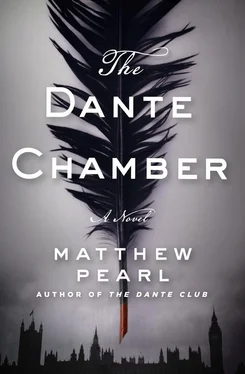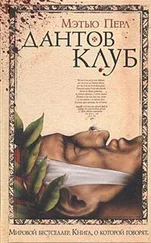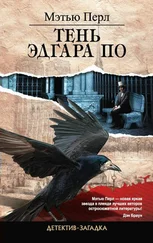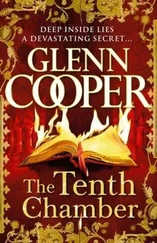Christina expected to find a blank expression staring back from Lizzie’s eyes. What amazed her was that in the grieving woman’s eyes she observed only love — the purest form of it. It was maternal love for a child — and in this case, a child no longer of this earth — that Christina secretly doubted she herself could possess. Perhaps, deep inside, that had always led her to swerve and duck attention from men who had been interested in her, to swat down the possibility of new family by using existing family as her excuses. My mother needs me... My aunts... My brother...
And yet, Christina had in the years since gradually composed poems she thought of as new nursery rhymes. As the playful lines came to her, she thought of the adventures she’d shared with Gabriel as children, when people used to say the two of them could see and read each other’s private thoughts. They tumbled, wrestled. They raced each other. They both read stories by Edgar Poe when others feared to. They competed to write verses quickly and argued over the greatness of nature. When Christina would stop to examine an interesting insect or patch of moss, Gabriel would stand in an impatient pose and shrug, not seeing what was at all interesting about it. Sometimes when writing her children’s lyrics she thought of Gabriel and Lizzie’s son, had he lived, and what he might have grown into.
People admired her poetry, but she knew there were plenty of readers who questioned it. How could she write brokenhearted verse if she never loved? Why did she compose so much about death if she knew little of life? Her emotions and insights must be affectation. Maybe they were right. Years earlier, she received a letter from a family friend complaining that her poems were sad and despondent. If my verses are sad , Christina replied, I suggest few people reach even the age of twenty without sadness, and if despondent, I take shame and blame to myself, as they show I have been ungrateful for the daily love and mercy lavished upon me. She added: (Please remember to see to it this letter is burned.)
The same people would think an unmarried, childless woman ineligible to understand and inspire children. She kept the nursery rhymes locked away in a drawer.
As she continued harvesting sheets of paper on her return to the other side of the house where Browning feverishly worked, Christina paused again at one of Gabriel’s mirrors, brushing off a film of dust. Both the mirror and her own reflection seemed to come from another place and era. There were so many mirrors in the room that you were never looking at yourself; you were looking at yourself looking at yourself.
Christina knew she had been a prettier girl than a woman, in part because of the preoccupied and remote expression usually fixed on her face, which convinced people she was in pain. Her skin looked olive from her Italian blood and yet also somehow colorless. But she knew that when deep enthusiasm and interest came to her, her sleepy oval eyes would beam, her pale skin would glow with warmth, and she became beautiful, and then ashamed because of it.
She knew how others saw her — even Robert Browning. Now that she was almost forty, her choices meant she had all but given up any chance for marriage; if there was still time left where it could happen, it was almost gone. She had given up one suitor in her youth because he did not share her strict religious views. She lived with her mother. She was, in short, an old maid. That is what people saw. They saw what she turned away — being a wife, being a mother.
One of Gabriel’s compatriots, Algernon Swinburne, had written a novel with the main character based on Christina, but unlike Christina, the character engaged in rather shocking and wild behavior; Christina pasted strips of paper over those startling sections but liked much of the rest of the story of her literary double. She would never say it to a living soul, but she enjoyed imagining what might have been .
Her place in society was small, fixed. Family, home, church, charity. Sitting at her writing table and sitting at her tea. There was her poetry, for which she was acclaimed. But she had produced only one volume of poetry in the eight years since “Goblin Market.”
There had been a time, of course, as an unknown poet when she had to introduce herself to the magazines if she wished to publish something. She could hardly bear it. To one editor, she wrote: I hope that I shall not be misunderstood as guilty of egotism or foolish vanity when I say that my love for what is good in the works of others teaches me that there is something above the despicable in mine . She woke up in the middle of that night, her head hot, her heart throbbing, realizing that “what is good in the works of others” could be construed as implying there was some that was not good, and that Christina’s was better. The next morning marked the first day she began to burn all of her letters she could find and to instruct correspondents to do the same.
There was nothing quite like the heat produced by those burning letters — or from the discarded poems and the particular short story she once wrote that was morally deficient — a heat that prodded her to try harder, to do better, to prevent future shame.
She had never been like other writers. She did not read voraciously, instead choosing the same stalwart books (the Bible, The Arabian Nights ) to read again and again, and did not really seek inspiration from reading. She never sought advice from publishers or friends, and when advice was proffered, from Gabriel or others, and she listened, her writing suffered for it. She hardly revised her work. She refused to publish a portrait of herself, however flattering and unlike her, in the frontispieces of her books. She did not chase fame or money like those other female poets who far surpassed her in popularity, such as Jean Ingelow. Poetry for Christina was not a mechanism but an impulse and a reality, and her aims in writing were directed to that which is true and right. If events of the last weeks and days proved anything, it was that her calling had increasingly become to serve her family, and at the moment that meant finding Gabriel.
CR — need your help . Gabriel’s message rang like a bell in her thoughts.
The way Christina and Browning pored over the ratty Dante Murders pamphlet for the next four hours, elbow to elbow, a bystander would have been forgiven for mistaking it for a sacred document.
The pamphlet was written in sloppy but enthusiastic prose. It recounted a scourge in Boston after the end of the American War of Rebellion. Prominent citizens had been discovered murdered in the style of the punishments Dante memorialized in the Inferno , the first part of Dante’s Comedy : a minister in the crypts beneath a church near Harvard College buried upside down, his feet set aflame, like the venal religious figures Dante encounters in one of the circles of Hell; a judge in Beacon Hill eaten alive by a rare breed of maggots, imitating the eternal state of what Dante named in another infernal circle the “neutrals”; and deaths even more shocking to the senses and less intelligible to the police.
The anonymous pamphleteer told how, in absence of wider knowledge about Dante, several preeminent men of letters, poets and a publisher among them, were left to decipher the true inspiration behind the horrors and became entangled in unraveling them as they prepared what became America’s first translation of Dante. Just as the pamphlet’s cover page withheld the name of the booklet’s author, the names of the literary participants in the narrative were concealed by aliases.
Christina sent for William to come to Tudor House to help examine the booklet for any insights into the eerie occurrence in London, so she and Browning could pursue finding more information that might lead them to Gabriel. Twice they called for a family friend, Charles Cayley, to look over a passage of Purgatory ; the agreeable translator was so studious and eager to please, he never asked about the peculiar assortment of labors in progress at Tudor House.
Читать дальше












